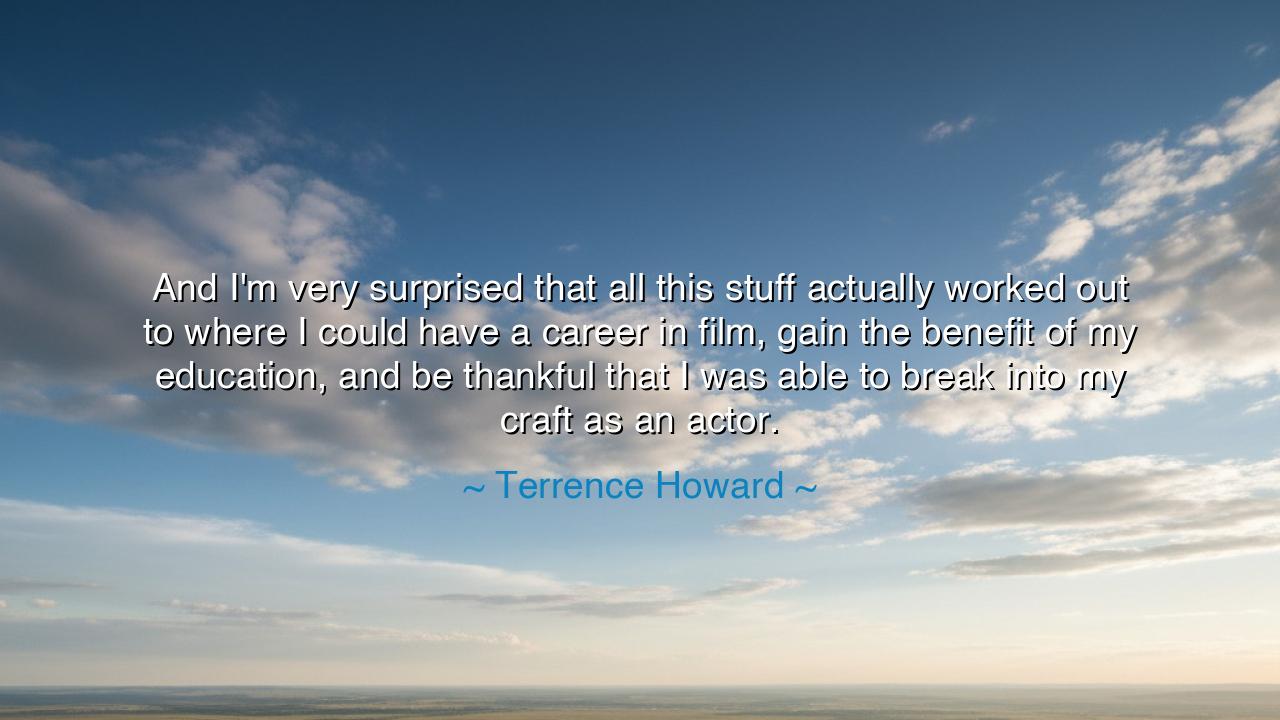
And I'm very surprised that all this stuff actually worked out
And I'm very surprised that all this stuff actually worked out to where I could have a career in film, gain the benefit of my education, and be thankful that I was able to break into my craft as an actor.






Terrence Howard once confessed with humility and awe: “And I’m very surprised that all this stuff actually worked out to where I could have a career in film, gain the benefit of my education, and be thankful that I was able to break into my craft as an actor.” These words carry the weight of one who knows how fragile dreams are, how uncertain the path of artistry can be, and how remarkable it is when the pieces of life align to form a calling fulfilled. His statement is not pride but wonder: a recognition that the road he traveled, with all its turns and trials, somehow led him to his rightful place.
The origin of these words rests in the struggle of every artist who dares to step into a craft that offers no guarantee of success. Howard, like so many before him, poured effort into both his education and his pursuit of film, never certain that one would connect with the other. That they did is for him a surprise—a miracle even—worthy of deep thankfulness. He acknowledges the delicate balance between preparation and providence, between human labor and unforeseen opportunity.
The ancients spoke of this balance often. The philosopher Seneca declared, “Luck is what happens when preparation meets opportunity.” Howard’s reflection lives in that very truth. He prepared himself with learning, discipline, and persistence. Yet even with such preparation, he admits he did not know if it would work out. When the opportunity arrived and bore fruit, his first response was not arrogance but gratitude, for he understood that talent alone does not guarantee triumph—one must also be carried by chance, by timing, by forces beyond oneself.
History offers countless echoes. Consider the story of Vincent van Gogh, who lived and died largely unrecognized. Though he had immense dedication to his craft, the world was not ready for him. His preparation bore little reward in his lifetime. In contrast, Howard’s surprise at his success stems from his awareness that many who labor with equal passion never see their craft open into a career. To be thankful is, in his case, to acknowledge both his own persistence and the rare fortune that others did not receive.
There is a heroic humility in his words: “I was able to break into my craft.” The language of breaking suggests force, struggle, resistance. The gate into artistry is not easily opened; it must be wrestled with, endured, sometimes stormed against rejection and doubt. That Howard speaks of this not as entitlement but as blessing reveals the wisdom of one who knows the cost. The craft did not yield itself freely—it required sacrifice, patience, and resilience. Gratitude, then, is the proper crown of such victory.
The lesson for us is this: when your path opens, when your efforts yield fruit, do not take it as inevitable or as your right. Recognize, as Howard does, the mystery of how preparation, opportunity, and timing intertwine. Be thankful not only for what you achieved, but for the chance itself to pursue your craft. Gratitude anchors ambition in humility, transforming success from self-glory into testimony of perseverance and providence.
Practically, this means embracing both discipline and gratitude. Prepare yourself with diligence in your craft, your studies, your labor, knowing that success is never guaranteed but always possible. When opportunities arise, seize them with courage, and when they bear fruit, speak words of thankfulness—to your teachers, your community, your God, and to the mysterious unfolding of life itself. In this way, you honor both your own struggle and the forces beyond you that made the journey possible.
Thus, Terrence Howard’s words endure as a teaching: that surprise, education, and gratitude are the marks of true achievement. To be surprised is to remain humble before fate; to be educated is to be prepared for its arrival; and to be thankful is to honor the gift once it comes. In this, he speaks not only as an actor, but as a witness to the eternal truth that every fulfilled calling is both work and wonder, discipline and grace.






AAdministratorAdministrator
Welcome, honored guests. Please leave a comment, we will respond soon